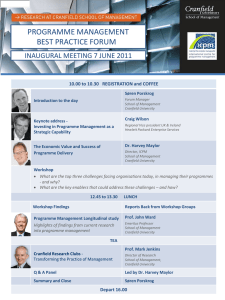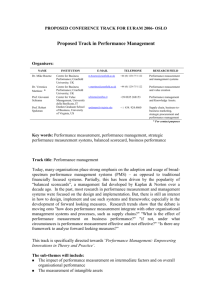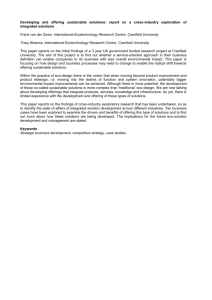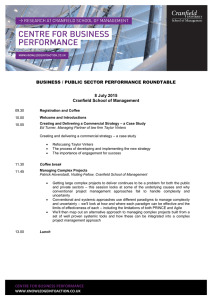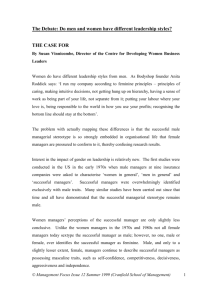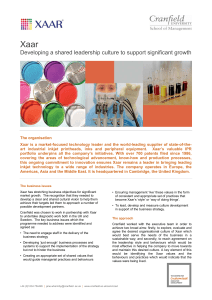Sellafield Ltd - Site License Companies
advertisement
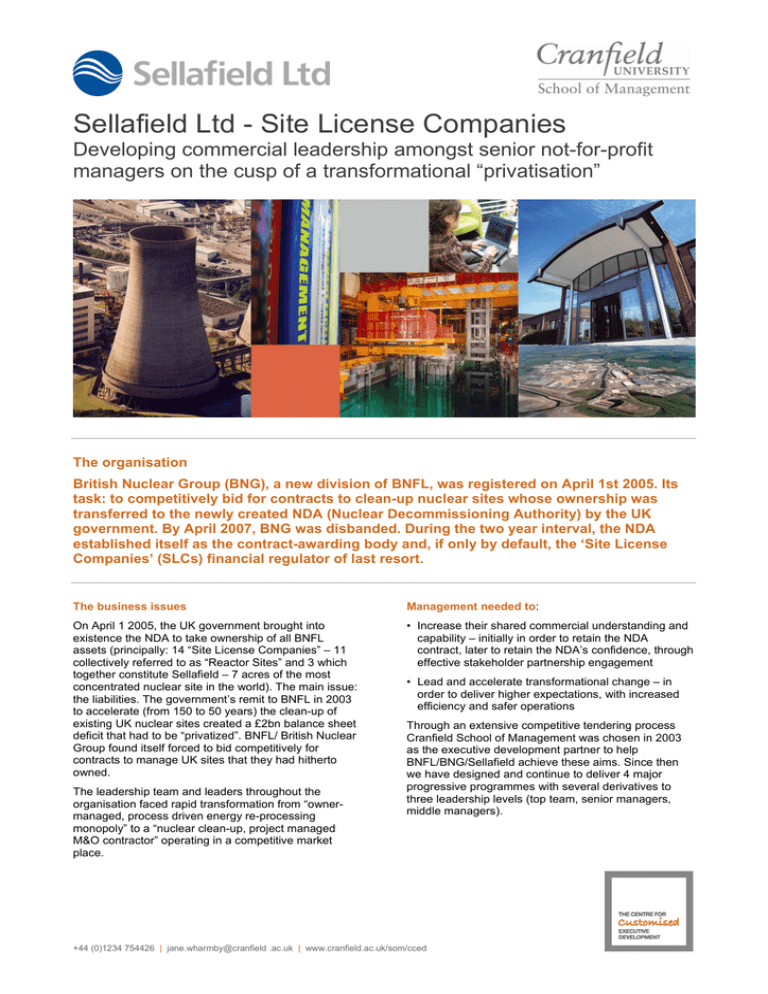
Sellafield Ltd - Site License Companies Developing commercial leadership amongst senior not-for-profit managers on the cusp of a transformational “privatisation” The organisation British Nuclear Group (BNG), a new division of BNFL, was registered on April 1st 2005. Its task: to competitively bid for contracts to clean-up nuclear sites whose ownership was transferred to the newly created NDA (Nuclear Decommissioning Authority) by the UK government. By April 2007, BNG was disbanded. During the two year interval, the NDA established itself as the contract-awarding body and, if only by default, the ‘Site License Companies’ (SLCs) financial regulator of last resort. The business issues Management needed to: On April 1 2005, the UK government brought into existence the NDA to take ownership of all BNFL assets (principally: 14 “Site License Companies” – 11 collectively referred to as “Reactor Sites” and 3 which together constitute Sellafield – 7 acres of the most concentrated nuclear site in the world). The main issue: the liabilities. The government’s remit to BNFL in 2003 to accelerate (from 150 to 50 years) the clean-up of existing UK nuclear sites created a £2bn balance sheet deficit that had to be “privatized”. BNFL/ British Nuclear Group found itself forced to bid competitively for contracts to manage UK sites that they had hitherto owned. • Increase their shared commercial understanding and capability – initially in order to retain the NDA contract, later to retain the NDA’s confidence, through effective stakeholder partnership engagement The leadership team and leaders throughout the organisation faced rapid transformation from “ownermanaged, process driven energy re-processing monopoly” to a “nuclear clean-up, project managed M&O contractor” operating in a competitive market place. • Lead and accelerate transformational change – in order to deliver higher expectations, with increased efficiency and safer operations Through an extensive competitive tendering process Cranfield School of Management was chosen in 2003 as the executive development partner to help BNFL/BNG/Sellafield achieve these aims. Since then we have designed and continue to deliver 4 major progressive programmes with several derivatives to three leadership levels (top team, senior managers, middle managers). +44 (0)1234 754426 | jane.wharmby@cranfield .ac.uk | www.cranfield.ac.uk/som/cced Customised Executive Development The approach Working in partnership with the HR talent development team in the SLCs, members of the top team and representative operators across the British Nuclear Group, Cranfield: • Designed modular interventions (some delivered in three day sessions, others delivered as a series of one-day sessions) that include business simulations and follow-up days to capture application and measure return on investment • Created a team of over 15 faculty subject experts with BNFL/BNG/Sellafield counterparts to ground the content and “share” the “teaching” • Assembled a team of 5 Programme Directors who in parallel with the teaching faculty coach participants and carry each programme’s “red-thread” across the various deliveries by different faculty • Designed a series of 11 customized e-learning capsules to support the main subjects explored during the face-to-face sessions • Created programme portals to hold all programme material and stimulate participant’s exchanges during and post programme. The programme All four programmes flowed from three bases of the process of leadership: • Setting Direction • Aligning Resources • Energizing Others Superimposed upon the two senior programmes were the three stages of innovation: discontinuous, incremental and inter-organizational. The following subjects were covered in detail: • Under Setting Direction: vision, mission, values, strategy, strategic assets, innovation and enterprise risk management • Under Aligning Resources: programme and project management, finance, supply chain management and performance measurement • Under Energizing Others: leadership, change management and personal style. The two more operational programmes took a more pragmatic line, structured around the five steps of accountable leadership: Delivering, safely, through empowerment, embracing change, with courage and impact. Facts and figures Sept 2003 to June 2004: Sellafield’s top team, 55 participants, completed three core modules. Further cohorts representing 60 participants undertook a modified programme in 2005 and 2006. September 2004 to February 2005: The Reactor Sites’ top team, 48 participants, started their version of the programme, adapted to their specific context. February to July 2005: Senior managers’ programme delivered, mirroring and supporting the senior team programmes. Completed by 100 participants. February 2006: Business Application Workshops conducted for some 50 participants from above programmes to apply commercial practice to a series of scenarios. April to December 2007: Completed first phase of “5 Steps to Accountable Leadership” for 80 participants. April 2008 to January 2009: Completed second phase of “5 Steps to Accountable Leadership” for 210 participants. Subjects covered in a tightly-knit series of one-day sessions are: Customer and Commercial Awareness; Delivering Projects with Financial Awareness; Human Factors in Safety Leadership; Measurements for Empowerment; Human Aspects of Empowerment; Empowering Appraisals, Disciplinaries and Grievances; Strategic Change; Innovation; Continuous Business Improvement; Impact and Influence; Courage and Confidence. This integrated development - designed through extensive one-to-one interviews and small group work, linked to group competencies, set against performance appraisals – encourages immediate application and cultivates a learning organization where, as iron sharpens iron, one individual sharpens another. Why Cranfield? “We have been through, and are still facing, a significant change in our organisational position. Cranfield joined our journey early in this process and were instrumental in helping to understand the learning gap in our Senior Management population. Cranfield have not only kept pace with the level of change but in some cases were ahead. How many calls have I taken from our Cranfield Programme Director, Cora Lynn? ‘Lesley, have you seen the papers – it was as I expected …’ In partnership each Cohort delivered has been refreshed and updated in light of the latest organisational position. Feedback from the programme has been excellent and there is evidence of significant cost savings across the business which can be attributed to certain aspects of the programme. I would have no hesitation in recommending Cranfield as a learning partner to any organisation.” Lesley Bowen, Head of Education, Training and Development, Sellafield Ltd +44 (0)1234 754426 | jane.wharmby@cranfield .ac.uk | www.cranfield.ac.uk/som/cced
